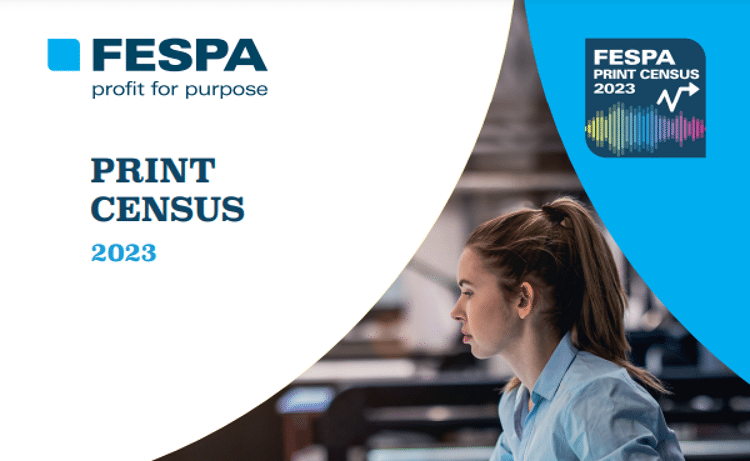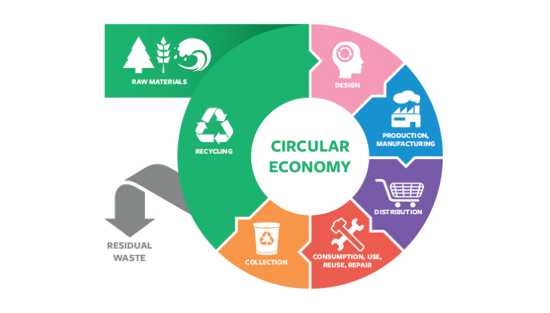FESPA Print Census: rising sustainability demands

Laurel Brunner discusses the importance of Sustainability in the FESPA Print Census. Respondents were all in agreement that there is a rise in sustainability demands. The FESPA Print Census provides a detail account of the latest industry trends for FESPA members.
Sustainability is at the top of the table, according to FESPA’s recently published findings from the latest Print Census. Respondents confirmed that rising sustainability demands are concerning them, along with keeping up with new business models and investment.
The survey of 1,778 printing companies from more than 120 countries was done in partnership with InfoTrends and focused on long-term trends identified in the 2018 Print Census. Five years ago printers were worried about the industry’s prospects including revenue and investment planning, customer expectations and rising environmental pressures. All of those concerns are still prevalent. However since the 2018 Census, respondents have seen an increase in average revenue of 7%: in 2018, average annual revenue was €4.4m, whereas in 2023 that figure was €4.7m. And today that 72% of print buyers want their service providers to be environmentally sustainable and to offer environmentally friendly products should be causing considerable excitement. That excitement might be good and/or bad, depending on where a business owner is on their sustainability journey.
For entrepreneurs coming into the graphics industry it should scream opportunity and provide powerful indicators as to the kind of kit they should be investing in. If 36% of respondents want both sustainable products and sustainable manufacturing, it’s a given that any business that meets those requirements will be able to tap into a ready and willing target market. Companies already investing in developing their sustainability credentials will also appreciate the vote of confidence that they’re on the right track. In all cases the business risk is substantially lower because the service provider already knows that their pitch will be well received. Perceived cost premiums associated with more sustainable products are not the barrier they once were to sustainable production. 70% of Print Census respondents said they can address sustainability expectations without price increases. A further 22% have already raised prices and have seen no impact on sales.
These numbers will make for gloomy reading for organisations who are not keen to invest in new energy efficient kit. Business owners reluctant to gen up on new substrates and colorants that are recyclable will also be feeling the pressure. And pressure it is to accept that the only way forward for this industry’s future success, is to take steps towards greater sustainability. Companies not planning to invest in the environmental sustainability of their business should be thinking again. The full Print Census report is available only to FESPA members, so if you are not yet a member, get signed up soonest. You can do so here.
Source Information: This article was produced by the Verdigris Project, an industry initiative intended to raise awareness of print’s positive environmental impact. This weekly commentary helps printing companies keep up to date with environmental standards, and how environmentally friendly business management can help improve their bottom lines. Verdigris is supported by the following companies: Agfa Graphics, EFI, Fespa, Fujifilm, HP, Kodak, Miraclon, RicohSplash PR, Unity Publishing and Xeikon.
Discover the latest innovations in sustainable print at FESPA Global Print Expo 2024, Europe’s leading print and signage exhibition. Taking place from 19th – 22nd March 2024 at RAI Amsterdam, Netherlands. Register here to visit and use promo code FESJ411 for a 30 euros discount.
Recent news

Kodak's 2024 Sustainability Report: A Commitment to a Greener Future
Kodak's 2024 Sustainability Report, "One World, One Kodak," demonstrates a strong commitment to environmental and social responsibility. The report highlights impressive reductions in greenhouse gas emissions (56%) and water withdrawal (31%) and aims for zero waste by 2025. Notably, Kodak is pioneering double materiality assessment in the printing industry, aligning sustainability with financial reporting, and showcasing its products' environmental benefits.

How can printers lower costs on energy usage?
Clare Taylor outlines simple steps for businesses to achieve energy sustainability, focusing on cost savings and staff comfort. It emphasises starting with measuring energy consumption to identify key areas for improvement. Subsequent steps involve managing energy use through behavioral changes and low-cost interventions, like optimizing cooling settings and ensuring equipment is switched off when not needed.

The European Union's circular economy plan
Printing companies must understand the EU's Circular Economy Action Plan (CEAP), part of the European Green Deal. These initiatives drive sustainability, impacting businesses globally, even if not EU-based, through customer requirements. Printers need to be aware of reporting and sustainability expectations to manage risks and retain clients.

A revised look at sustainability in wide format print
Sustainability is crucial for wide-format print, moving beyond marketing to an imperative driven by brands and regulations. Common "eco" claims often mask complexities; true sustainability demands carbon reduction as a core principle. Life Cycle Assessment (LCA) offers data-driven insights for genuine environmental improvement, as demonstrated by UFABRIK's transparent approach.